Advertisement
New Bedford Clergy And Police Fight Opioid Epidemic One Person At A Time
Resume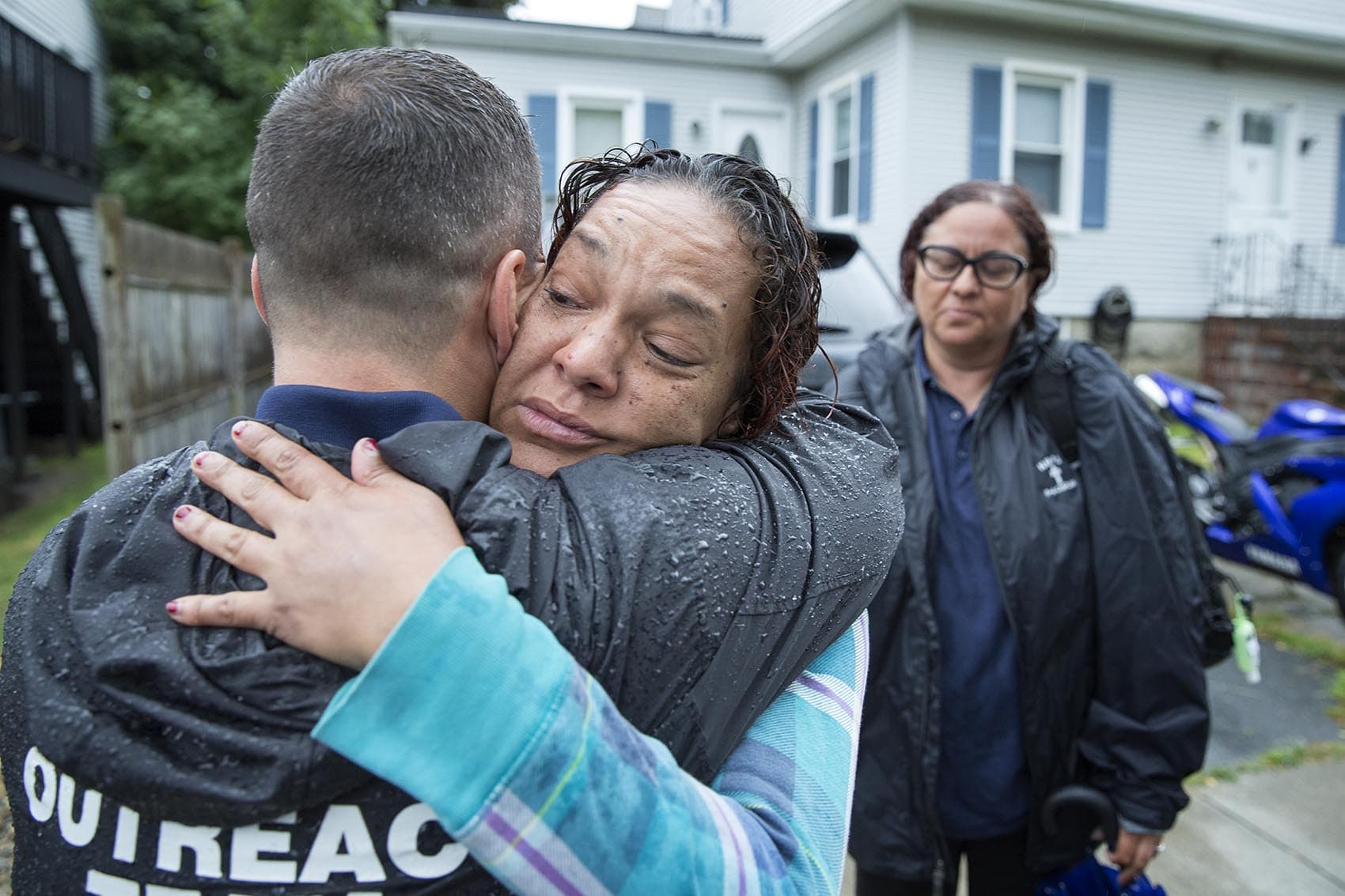
It's a gray, rainy late summer afternoon, and four members of New Bedford's opioid outreach program have gathered outside the city's police headquarters. They're about to head out on the streets, to search for people who recently survived an opioid overdose.
The police officer on today's team is Lt. Arthur Hegarty. He's not in uniform — just khakis, a short-sleeved collared shirt, and fleece vest. He has a clipboard with names and addresses of seven people the team will try to visit. Most of the addresses come from 911 calls reporting overdoses.
The goal isn't to arrest anyone. The team wants to talk, to engage — to try to steer a person away from a fatal overdose.
"It's all about trying to connect with them, build that relationship, build the trust," says Reverend David Lima. He heads the Inter-Church Council of Greater New Bedford, and he and his wife co-pastor New Seasons Worship Center in East Freetown. Lima and the police started the opioid outreach program more than two years ago.
New Bedford is one of the Massachusetts cities that's been hit particularly hard by the opioid epidemic. Between April 1, 2014 and August 10, 2017, 1,601 people in the South Coast city suffered opioid overdoses, according to New Bedford Police. One-hundred-and-ten of them died.
Each opioid outreach team is made up of a police officer, a member of the clergy, and some type of drug counselor. Many of them grew up in New Bedford. They have an ambitious goal for the people they visit.
"The best outcome, the ultimate, would be to get them into treatment beds -- being able to get them to a place where they'd be able to get the help they need long term."
Reverend David Lima
"The best outcome, the ultimate, would be to get them into treatment beds — being able to get them to a place where they'd be able to get the help they need long term," Lima explains.
So the hope is high. The expectation is modest.
The team members head out in an unmarked police car. They say they don't want to raise fear or shame for people struggling with addiction.
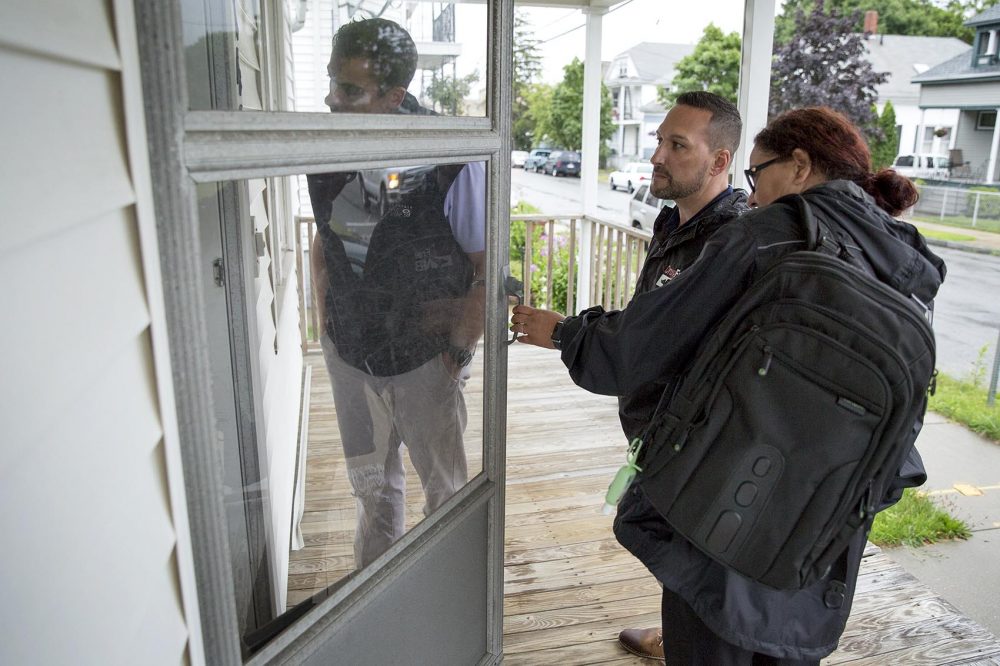
The first stop is the home of a man who did not recently overdose. His family asked the outreach workers to visit. We stay back with Reverend Lima while the team goes to the door.
Lima says the first challenge is just to get inside.
"Once you get in the house, the team really works well in being able to help people understand that it's about caring," he says.
Using Faith To Connect
What sets this outreach program apart from those running in some other communities is that a member of the clergy goes on every ride; this evening, there are two, Rev. Lima and Pastor Jamie Casey. They say they're not proselytizing, but they're looking for opportunities to use faith to connect.
For example, Lima says, if he sees a Bible in someone's home, he might ask if the person who's abusing drugs is part of a church.
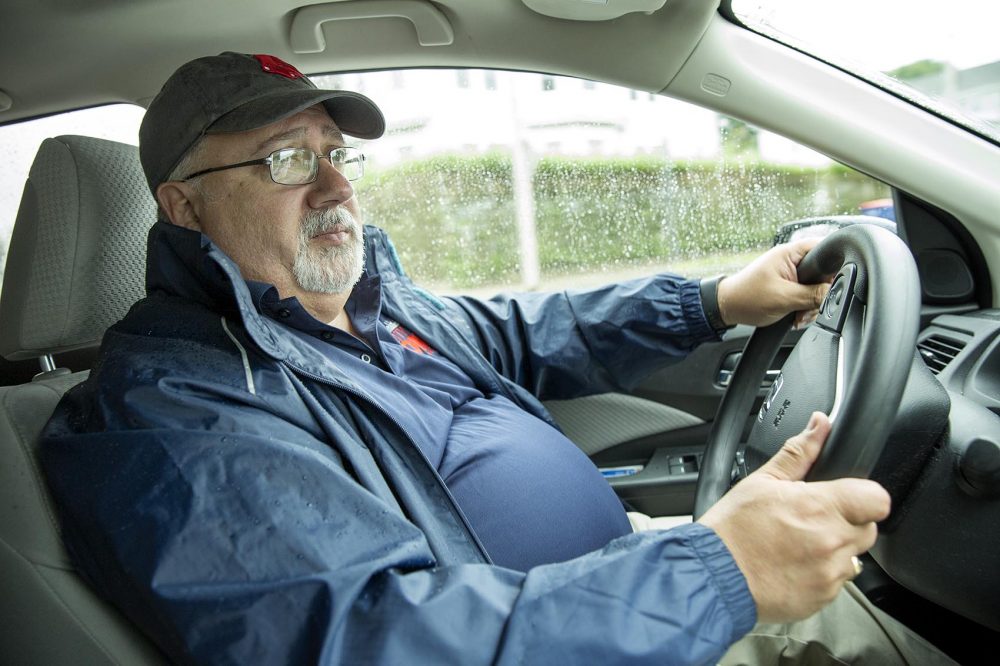
"You find many times that they may have been, but because their use is up, the shame and stigma, the guilt of 'being before God while I am in sin,' they have separated themselves. Well, we try to connect them again... by telling them, 'Look, did these people care for you when you were there?' [They respond], 'Oh, yeah, they were always worried about me.' I says, 'Well, I bet they still do.' "
As we talk, the team members are invited into the first house. They come out after about 15 minutes. The counselor on the team, Connie Mimoso from Seven Hills Behavioral Health, explains what happened.
"Basically, we engaged with a family member. The party we were looking for stayed away from us... downstairs in the basement. And [the mother] disclosed that he has heavy mental illnesses... and that he's living in the basement. He only comes up now to eat — that's it... So a lot of times we have to engage with the family in order to begin to break some of those barriers."
By that standard, this was a successful visit.
At the second stop, the woman the outreach workers want to speak with is sleeping. Her boyfriend says she's doing well and getting help. The team has no way to know whether this is true.
'Before, It Felt Like Nobody Cares'
Next, the team heads off to find a woman it's visited before. Lt. Hegarty says the woman previously indicated she was "open to a follow-up check-up." He stops the car across the street from an apartment. It's in a white multi-family house in a middle class neighborhood.
The woman is outside on the sidewalk. She darts toward her apartment when she sees the unmarked cruiser, but it's locked. When she turns around, she recognizes one member of the outreach team: Pastor Casey. He calls her by name — Tenelle — and they start to talk. After a couple minutes, Casey turns to us.
"Tenelle was just telling us that she's actually ready for detox," he says. Tenelle answers, "Mmm hmm."
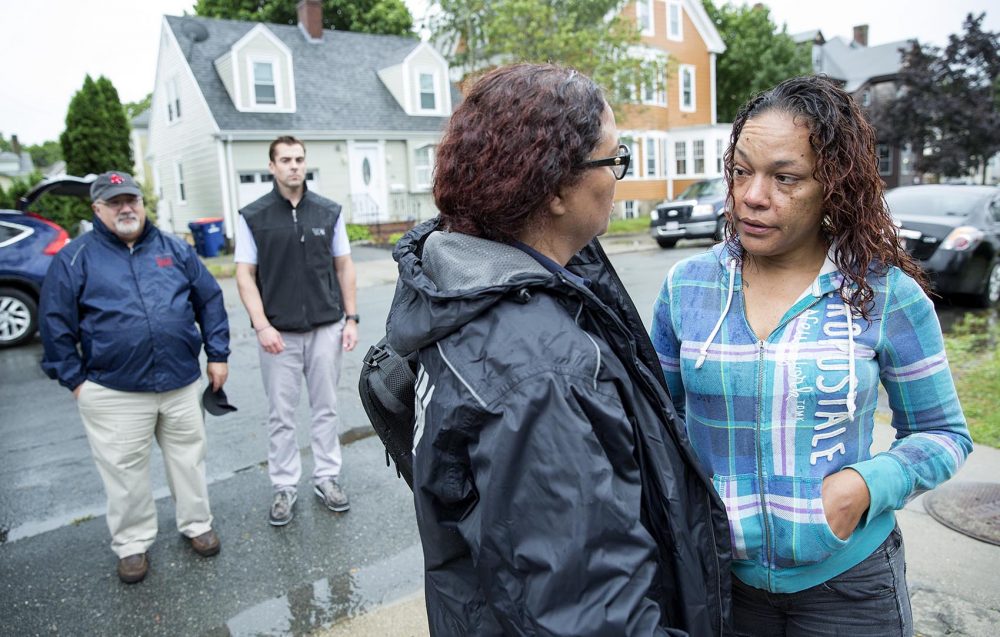
Those words are like gold. Someone's deciding to get clean. The outreach workers don't waste a second when Tenelle, whose last name is Pina, says she'll be ready to go tomorrow but she needs transportation. They say they will have someone there to pick her up at 9 a.m.
Pina is 40 years old — a mother of four. Her children don't live with her. Her brother does live with her, but she says she wants him out and he's leaving tomorrow, because he's addicted to opioids too.
She tells us her story, as the skies open up and the group huddles under umbrellas. Pina says she's been using heroin and other opioids for 15 years. She says she doesn't know how to explain why she's ready to get clean now.
"Um, it's harder. Like they say, the runs get shorter," meaning her heroin highs don't last as long as they used to. "And it's harder to find dope around here these days too — a lot of fentanyl going around."
The opioid fentanyl is often mixed with heroin. Fentanyl is more powerful and is currently causing most of the overdoses in Massachusetts. But Pina says she's scared of going through withdrawal. She's tried to get clean many times.
"I said it a bunch of times — I just want to shake it," she adds. "It's a very hard habit to shake. My kids' father told me when I first started messing with it, he said, 'You're in for a ride 'til the wheels fall off.' "
She welcomes the help from the outreach workers.
"Before, it felt like nobody cares, you know? And they really didn't," Pina reflects. "I think they started caring when it started reaching their homes. Their kids started overdosing and stuff, you know? Then there's a problem."
She doesn't think everyone would be as receptive to the outreach team's overtures, though.
"They would be afraid, even if they wanted help. I thought I was gonna get arrested real quick, because, like, people, when we're using, we pick up charges along the way, too, you know?" Pina says. "Because sometimes we do whatever we need to do to get high."
Pina asks if anyone on the team is in recovery from addiction. Pastor Casey answers yes — he's been in recovery for eight years. Both of them have used the 12-step programs Alcoholics Anonymous and Narcotics Anonymous.
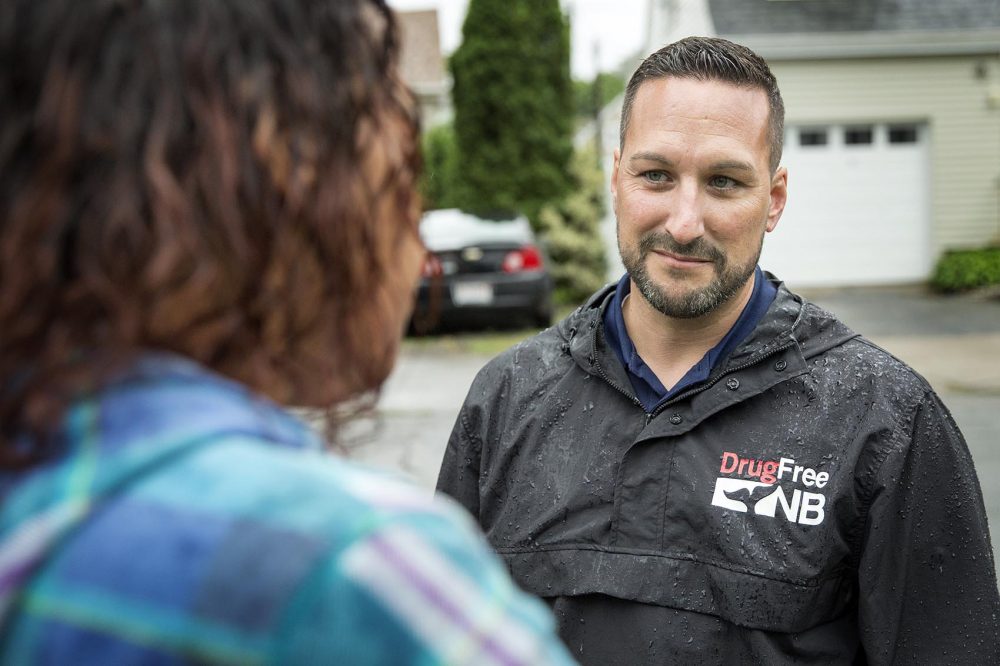
The two have another connection. Pina mentioned her faith.
"She said, 'I believe in God. I believe God is good,' " Casey recounts after getting back in the car. "And I said, 'I believe he just showed up and proved that to you, you know?' "
Turning Down The Help
Teams go out three nights a week. They've made more than 900 visits — or attempted visits — since the program started in 2015.
Organizers of the program say no one has raised privacy concerns over the teams showing up unannounced, using addresses from the 911 call database — which is public record. In rare instances, family members were not aware of their loved one's overdose until the team showed up at their door.
On the night we go out, one woman tells the outreach workers her son who uses drugs no longer lives at the house, and she asks them to not come back.
And there's a young man who recently overdosed at his father's grave site. He had a gun in his car at the time — legally, according to the outreach workers. The team is concerned he could use the gun — that he could be suicidal. But the man says he's all set and doesn't want any help.
'A Lot Of Mothers Are Suffering'
At another home, there's a much different response.
Two of Lucinda Pereira's sons, both adults, are addicted to heroin. One of them is doing better lately. But the other one has overdosed repeatedly. He's been saved by another brother using the overdose reversal drug Narcan.
"Does he want to get well? When you talk to him, does he say he wants treatment? Does he want to get away from the drugs?" Casey asks Pereira as the group talks with her at her front door.
"Yes, he do," Pereira answers, before transitioning into Portuguese, her native language.
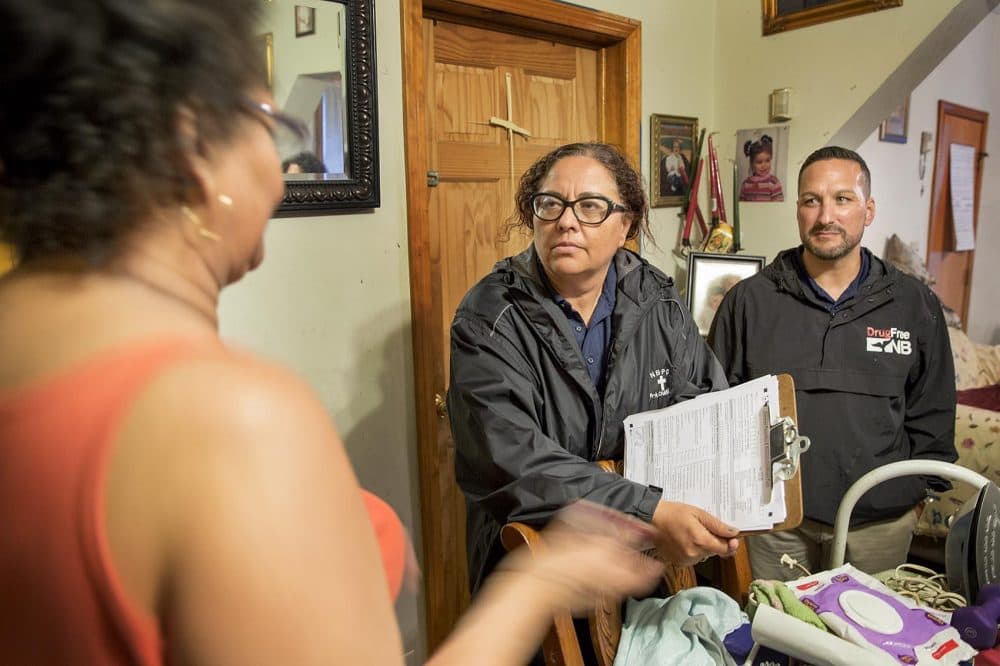
Pereira doesn't know where that son who's struggling the most is at the moment. She says he'll probably come home in the middle of the night.
"Sometimes I want to leave him out, but sometimes I say, 'God, if I leave him out, how about something happen to him, or he done something bad,' " Pereira says. "So I open the door, he comes in, he eats, he takes a shower, he sleeps."
"You're his mom. That's what you do," Casey responds. He then tells Pereira the team can connect her with a parents' support group and other resources to help herself.
The team finds out Pereira doesn't have any Narcan on hand. Mimoso, the counselor, trains her how to use it and leaves two doses with her. The team members also leave their business cards and pamphlets. They ask Pereira to tell her youngest son they'd like to talk with him.
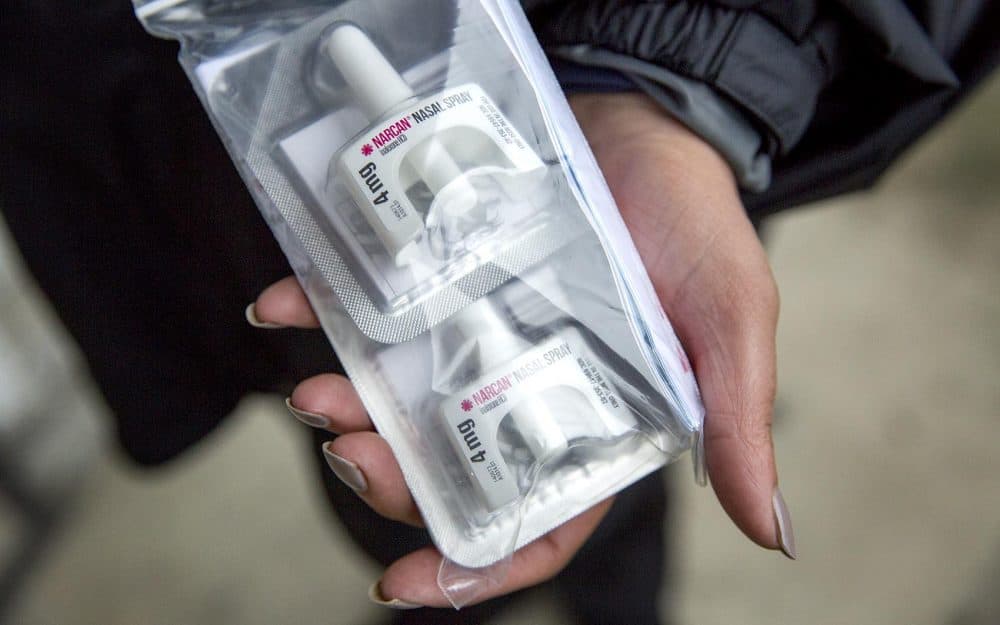
She says she'd do anything to see her kids get off opioids.
"I think I'd be the happiest mother in the world. Goes for me and goes for all the mother who suffer, because lot of mother are suffering with this, you know?" Pereira says, crying. "I don't just pray for me, I pray for the people, because a lot of people is deal with these things, just like I am, you know? No matter how good you raise your children."
The conversation with Pereira paid off. The next day, her son contacted Casey and went into detox. He then transitioned to outpatient treatment.
And that morning, Tenelle Pina walked to Pastor Casey's office instead of waiting to be picked up. The agency where Casey works — Positive Action Against Chemical Addiction — found Pina a detox bed. Her exact status now is unknown.
Organizers of New Bedford's opioid outreach program say almost 15 percent of the people they visited in the last 18 months entered detox, or at least accepted the referral. About 41 percent took the teams' referrals to outpatient treatment or support services. Less than one percent entered residential treatment.
One sign of hope in New Bedford: Police there say opioid overdoses declined 13 percent in the first seven months of this year, as compared to the same period in 2016.
Pastor Jamie Casey says he had a 20-plus-year battle with addiction to alcohol, cocaine, opiates and prescription drugs after enduring trauma as a child. Eight years ago he went into recovery through a Christianity-based rehab program. That led to him becoming a pastor and outreach worker. Here, Casey talks about his journey:
Share your experiences, and follow along with our reporters as they cover opioid use and treatment, by joining our Facebook group, "Living The Opioid Epidemic."
This segment aired on September 14, 2017.

